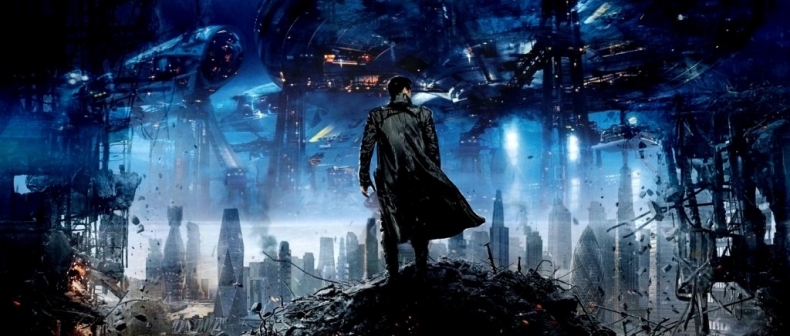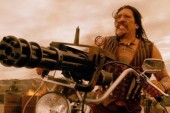
People who see Star Trek Into Darkness will experience the film in one of two ways. (Actually, each audience member is an individual with his or her own preferences and prejudices and will therefore experience the film in his or her own personal way, but, you know, whatever.) Some will watch it as a piece of entertainment featuring characters they vaguely recall from the odd rerun of “The Original Series” (or from the more common pop culture reference toward William Shatner’s speech patterns in that series), but others will experience it as another chapter within the Star Trek canon, against which Into Darkness will forever be contextualized. To the credit of JJ Abrams and his writers, this chapter works in both capacities, as an individual story and as a small piece of a larger mythology. Or rather, it worked for me on both levels, but there are individuals far more knowledgeable than I regarding the Star Trek canon and they may disagree.
When JJ Abrams tackled the dormant Trek franchise in 2008, he was tasked with creating a film that would appeal to young filmgoers and also “honour the legacy of the franchise,” which is another way of saying that pissing off the old fans creates bad publicity and should be avoided. He solved this conundrum by using a nifty little narrative trick that left him tell an origin story (the 21st century’s favourite kind of story) about Captain Kirk and Spock, without inadvertently trampling all over the well-documented history of the Star Trek Universe.
That nifty little narrative trick, of course, is the creation of an alternate timeline, which created an alternate universe with alternate destinies for its characters and allowed Abrams to do pretty much whatever he wanted with Star Trek canon, like transforming Kirk from the team-building leader of the original series into another arrogant white boy destined for greatness. Cleverly, Abrams also left the original universe untouched, indulged the average Trekkie’s fondness for time travel technicalities, and allowed Leonard Nimoy to return in a cameo role that actually functioned with a narrative purpose.
This reinvigoration of the Star Trek franchise contrasts with other TV adaptations, like Mission Impossible or Charlie’s Angels, that merely recast the original roles and brought them to present day. Star Trek 2.0 also exemplifies this century’s obsession with origins and mythologies. Perhaps the internet is to blame, or maybe the studios are flattering our intelligence, but at some point in the last ten years, we collectively became OK with not only sequels, but also prequels, spin-offs, reimaginings, and, of course, “re-boots,” to popular movies. Marvel Studios spent the last five years creating a cinematic habitat for its Avengers while Fox spent the same amount of time trying to make spin-off gold from the ashes of the X-Men franchise.
Somehow the peculiarities of comic books (sorry, graphic novels) and long-running science fiction series–peculiarities that once belonged to the niche of nerd culture–became a part of the mainstream. That’s why we have the new Star Trek, the “not your father’s Star Trek,” a gargantuanly budgeted series whose entire narrative underpinning is a piece of time travel trivia that would have pleased Comic Book Guy. That’s the real reason this ain’t your average hypothetical father’s Star Trek, because your average hypothetical father isn’t a Trekkie, so he wouldn’t have put up with that nerdy bullshit.
But that’s not to say we (or our actual father’s) should not put up with that nerdy bullshit. While some may yearn for the simple pleasures of a self-contained story, the complex mythology of Star Trek offers its own rewards, and one can certainly follow the plot of Star Trek Into Darkness without knowing its extensive backstory.
Into Darkness isn’t perfect, and an inevitable backlash will occur when someone bothers to describe in detail the morass of plot-holes and unexplained character motivations. Fortunately, the movie moves along so quickly that you probably won’t notice the problems until later. It’s real advantage lies in the actors and the chemistry of the cast, all of which are stellar. JJ Abrams comes from a background of serialized storytelling, and it shows in the character work, even if there are times when Kirk (Chris Pine) and Spock (Zachary Quinto) feel like Lost’s Jack and Locke, if Jack and Locke were destined to become great friends.
Abram’s film incorporates the events of the older films in a manner that is, like the time travel twist of its predecessor, both ingenious and infuriatingly clever. When Leonard Nimoy shows up as deus ex machina to give Spock some vital information, it’s definitely too clever, but there’s a scene near the end concerning the fate of a major character that parallels The Wrath of Khan (the best film of the original series) in such an ingenious manner that, well, I was kind of touched, which I’ll never admit to again, so don’t fucking ask me.
I’m not sure where Abrams and Paramount will take this franchise next. The Klingons, promised as villains in the marketing, were given a short shrift in Into Darkness, so perhaps they’ll explore the politics of Star Trek a little more thoroughly on the next outing. But with the way the nerds have inherited the contemporary blockbuster, I wouldn’t be surprised if we saw an alternate timeline version of The Next Generation pop up sometime soon. Maybe they’ll draft Tom Hardy, whom played Captain Picard’s younger clone in Star Trek: Nemesis, to reprise his role. That’s a pretty nerdy notion, and I wouldn’t bet on it, but if Marvel manages to turn Ant-Man into a financial success, then I wouldn’t bet against it, either.
____
Alan Jones writes about film for Toronto Standard. You can follow him on Twitter at @alanjonesxxxv.
For more, follow us on Twitter @TorontoStandard and subscribe to our newsletter.














